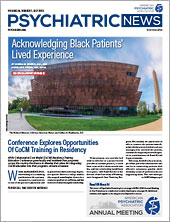Psychiatrists performing competency assessments of patients requesting physician aid in dying (PAD) have a duty to address existential despair and demoralization, in addition to underlying depression and other aspects of competency, said John Peteet, M.D., at APA’s 2023 Annual Meeting.
Peteet is an associate professor of psychiatry at Harvard University and director of the fellowship program in psychosocial oncology and palliative care at the Dana Farber Cancer Institute.
Peteet spoke at the session “Physician Aid in Dying Based on a Mental Disorder: What Have We Learned? Lessons for the U.S. and Rest of the World.” At the session, Karandeep Gaind, M.D., a former president of the Canadian Psychiatric Association, addressed the expansion in Canada of PAD to
nonterminal conditions, including, possibly, mental illness, and warned of PAD’s expansion in the United States.
In this country, PAD is legal in 10 states and the District of Columbia, reserved for patients with a terminal illness and a life expectancy of six months or less. Psychiatrists in these jurisdictions are increasingly being asked to assess the decisional capacity of individuals requesting PAD.
Peteet argued that the unique nature of PAD calls for special attention to factors beyond the
criteria developed by past APA President and forensic psychiatry expert Paul Appelbaum, M.D., and Thomas Grisso, Ph.D., professor emeritus of psychiatry at the University of Massachusetts, for assessing capacity in 1988.
“Rather than a straightforward assessment of depression and the patient’s intellectual understanding of what is involved, the psychiatrist, as a physician helping patients to consider this unique and permanent request, has a responsibility to assess for potentially treatable contributing conditions, including demoralization,” Peteet said.
He suggested there is little consensus about the standards for capacity. He cited a
2006 report by Linda Ganzini, M.D., M.P.H., which found that psychiatrists’ personal beliefs about PAD largely determined their opinion about what the standards should be: Of psychiatrists who believed PAD never to be ethical, 68% stated that patients with dysthymic disorder were automatically incompetent, compared with 21% of psychiatrists who believed PAD ethical in some or all cases.
“The fact that assisted death is now legal in an increasing number of jurisdictions does not absolve clinicians of the responsibility to optimize the decision-making capacity of individuals requesting their help,” he said. “Rather, it highlights the need to more clearly understand what full capacity entails and what the role of the psychiatrist is.”
He said studies in Oregon (where PAD was first legalized in the United States) and other jurisdictions including the Netherlands show that existential rather than physical suffering is behind many, if not most, requests for assisted death. “In addition to assessing for capacity in the usual sense of ability to meet the Applebaum criteria for medical decision-making, I believe that psychiatrists have a role in assessing and attending to these patients’ existential pain,” Peteet said.
“PAD is not yet legal in Massachusetts, where I practice, but the patients I’ve seen who ask for information about it or who ask to forgo life-prolonging treatments are often dealing with the loss of a valued aspect of their identity, such as work or loss of control and autonomy,” he said. “Some feel that their life is complete and that they have suffered enough. My role with them is not to talk them out of a decision to die, but to help them feel the comfort of having genuinely explored all of the options available to them consistent with who they are. This involves listening for what their existential suffering is about, helping to clarify whether it’s remediable, and helping them find comfort even when it cannot be relieved.”
Peteet said, “We can gently ask—Where has the patient found meaning in his life? Are there new unresolved questions prompting the request? Has anyone helped the patient to question distorted, emotionally driven, and disabling perceptions informing his despair? Are sources of resilience that could reshape the patient’s approach to suffering being considered? If patients have a religious or spiritual tradition, what ways of dealing with suffering does it offer and have these been tried?” ■

